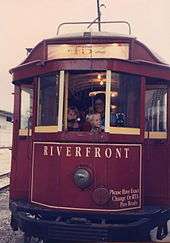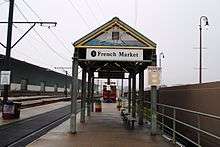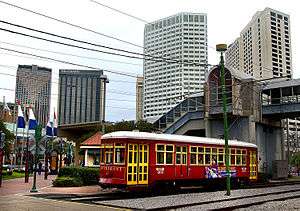Riverfront Streetcar Line
| Riverfront Streetcar line | |
|---|---|
|
A 457 Series Perley Thomas replica streetcar operating on the Riverfront line | |
| Overview | |
| Type | Heritage streetcar |
| System | New Orleans Regional Transit Authority |
| Status | Operational |
| Locale | New Orleans, Louisiana |
| Termini |
French Market John Churchill Chase |
| Services | Route 2 |
| Operation | |
| Opened | August 14, 1988[1] |
| Owner | New Orleans Regional Transit Authority |
| Operator(s) | New Orleans Regional Transit Authority |
| Character | Exclusive right-of-way |
| Technical | |
| Line length | 2 mi (3.2 km) (total) |
| Track gauge | 5 ft 2 1⁄2 in (1,588 mm) |
| Electrification | Trolley wire |
| Highest elevation | At-grade |

The Riverfront Streetcar Line is a historic streetcar line in New Orleans, Louisiana. It is operated by the New Orleans Regional Transit Authority (RTA). It was built along the east bank of the Mississippi River, in an area with many amenities catering to tourists. It opened August 14, 1988, making it the first new streetcar route in New Orleans in 62 years. The line runs 2 miles (3.2 km)[2] from Thalia Street at the upper end of the New Orleans Convention Center to the downriver (far) end of the French Quarter at the foot of Esplanade Avenue. Unlike the other three lines, it travels on an exclusive right-of-way, along the river levee beside New Orleans Belt Railway tracks. The line was regauged in 1997 from standard gauge to broad gauge. Officially, the Riverfront Line is designated Route 2 and is designated with a blue color on most RTA publications.
History
Two retired Perley Thomas streetcars, formerly running along the Canal line until 1964, were repurchased and refurbished, along with two W2-type streetcars originally from Melbourne, Australia. It was the city's first streetcar line to offer handicapped access, using the Melbourne cars; the historic landmark status of the Saint Charles route prevented the modification of the cars on that line.
From the time it opened in 1988, the Riverfront line was originally single-track, 4 ft 8 1⁄2 in (1,435 mm) (standard gauge), with one passing siding. But the line proved to be so popular that this was inadequate, so in 1990, it was temporarily closed and a second track was added. At the same time, another repurchased Perley Thomas streetcar and another ex-Melbourne streetcar were added to the fleet. The six cars in the fleet were all renumbered into a common series before entering service, with the three original New Orleans (Perley Thomas) cars being numbered 450, 451, and 456 (ex-924, 919, and 952, in that order).[3] The W2-type cars were numbered 452, 454, and 455 for Riverfront service, and were formerly Melbourne cars 626, 478, and 331, respectively.[1]

By 1997, RTA felt the need for additional wheelchair access on the Riverfront line. It was decided to build new streetcars, which would be replicas of the venerable Perley Thomas cars, but would have more modern trucks and controls. The first such car used the body shell of another repurchased Perley Thomas streetcar, number 957 (renumbered 457), with a wheelchair access door cut into its side. Six additional replica car bodies, which became cars 458–463, were built from scratch in the venerable Carrollton Shops. After some experimentation with secondhand PCC trucks and controls salvaged from retired Philadelphia streetcars, initially installed in two cars (457–458),[4][5][6] eventually all seven new cars were equipped with trucks and controls from the Czech builder ČKD Tatra.[7]
At the same time, it was decided to regauge the Riverfront line to broad gauge (5 ft 2 1⁄2 in (1,588 mm)) to conform to the St. Charles track gauge, and to build a connecting track on Canal Street from St. Charles to Riverfront. This would make it much easier to service Riverfront cars at Carrollton Station, and they could even be housed at Carrollton rather than out in the open at the ends of the Riverfront line.
The last day of standard gauge operation of Riverfront was September 6, 1997,[8] after which the line was again temporarily closed and the track gauge changed. The three Perley Thomas cars and the three ex-Melbourne cars were retired at this time. The ex-Melbourne cars were sold to the Memphis Area Transit Authority, for use on that city's Main Street Trolley line.[8] One of the Perley Thomas cars was sent to the San Francisco Municipal Railway, and the other two were stored at Carrollton Station. The Riverfront line reopened on December 13, 1997,[6] with the new cars running on the broad-gauge track.
Operation
The Riverfront Streetcar operates between approximately 7 a.m. and 10:30 p.m. seven days a week. Frequencies range from 15 minutes on the weekends in the afternoons to 20 minutes late morning to early evenings during the weekdays, with early mornings and late evening being the least frequent at 40 minutes.
Due to complaints regarding infrequency of service on the Riverfront line, NORTA has now installed LCD screens at each of the stops along the route to show approximate incoming times in each direction, as well as an animated display showing destinations and stops in both directions along the line. These times have often proven inaccurate due to fluctuations in the time required to traverse the track length.
Stop listing
From the French Quarter to the Convention Center area
| Stop | Neighborhood(s) | Other streetcar lines | Notes |
|---|---|---|---|
| French Market | French Quarter | Northern terminus of Riverfront line. Near the intersection of Peters Street and Esplanade Avenue. Serves French Market and New Orleans Mint. | |
| Ursulines Street | French Quarter | Serves French Market. | |
| Dumaine Street | French Quarter | Serves Jackson Square, Preservation Hall, St. Louis Cathedral and Woldenberg Park. | |
| Toulouse Street | French Quarter | Serves Jax Brewery and Woldenberg Park. | |
| Bienville Street | French Quarter | Serves Woldenberg Park. | |
| Canal Street | Downtown, Central Business District, French Quarter | Within walking distance of Canal Streetcar Line, track connection to Canal Street tracks. Connects with Algiers Point-Canal Street Ferry and Gretna Ferry. Serves Audubon Aquarium of the Americas, Harrah's Casino, IMAX Theater, Spanish Plaza, Woldenberg Park, and World Trade Center. | |
| Poydras Street | Downtown, Central Business District | Serves British Plaza roundabout, The Outlet Collection at Riverwalk, Harrah's Casino, and the Hilton Riverside. | |
| Julia Street | Downtown, Central Business District | Serves Port of New Orleans, The Outlet Collection at Riverwalk, and Morial Convention Center . Currently serves as Southern terminus of the Riverfront line. | |
| John Churchill Chase | Central Business District | Physical Southern terminus of Riverfront line; however, Julia Street currently serves as the line terminus. Serves Morial Convention Center. Stop is located just north of the Crescent City Connection bridge. Named for local native and cartoonist John Churchill Chase (his namesake street was formerly called Calliope). |
References
- 1 2 Wilkins, Van (Autumn 1994). "Veterans From Down Under". The New Electric Railway Journal. Free Congress Foundation: 23–24. ISSN 1048-3845. Retrieved 2014-12-08.
- ↑ "APTA Streetcar and Heritage Trolley Site - New Orleans Overview". American Public Transportation Association. Retrieved July 16, 2013.
- ↑ Sebree, Mac, ed. (1993). 1993 North American Light Rail Annual and User's Guide. Glendale, CA: Interurban Press. p. 42. ISSN 0160-6913.
- ↑ Lietwiler, C. J. (December 2004). "New Orleans: Streetcars return to Canal Street". Tramways & Urban Transit. Hersham, Surrey, UK: Ian Allan Publishing/Light Rail Transit Association. pp. 452–456.
- ↑ Rice, Walter E. (November 1997). "New Orleans: Where Perley Thomas streetcars still rule". Light Rail and Modern Tramway. Ian Allan Publishing/Light Rail Transit Association. pp. 422–425.
- 1 2 "Systems News" section, Tramways & Urban Transit magazine, February 1998, p. 79.
- ↑ Korbel, Viktor (November 1999). "T6C5: A Czech tram for North America". Tramways & Urban Transit. Ian Allan Publishing/Light Rail Transit Association. p. 408.
- 1 2 TNERJ staff (Autumn 1997). "The New Ladies in Red". The New Electric Railway Journal. CityRail Ltd. 10 (1): 36–37. ISSN 1048-3845. Retrieved 2014-12-08.
